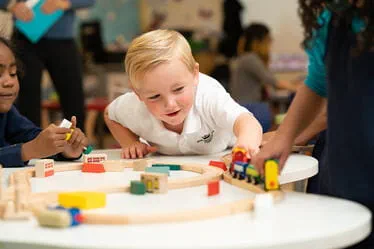How can we future proof education so students can handle what tomorrow will bring? Nord Anglia’s Education’s (NAE) Director Andy Puttock says schools have shifted from being transmitters of knowledge to becoming environments for students to develop the skills and qualities needed to thrive in the future, and keep pace in a rapidly changing world
Nord Anglia’s Education’s (NAE) Director Andy Puttock says schools have shifted from being transmitters of knowledge to becoming environments for students to develop the skills and qualities needed to thrive in the future, and keep pace in a rapidly changing world
In 2014, while in Tanzania’s Arusha region as part of NAE’s global expeditions programme, Chenoa and Sierra (both aged 17) visited the homes of village residents and were dismayed to discover the ceiling in their homes smeared with a thick layer of ash from burning fuel or excessive amounts of wood daily. Women from these families would be stuck at home, forced to cook using an inefficient and wasteful fuel-burning method for preparing meals that would take the entire day, preventing them from the chance to seek paid work or an education.
Confronted with the challenge of improving the standard of living for these village residents and slowing down the rate of deforestation in the surrounding area from the excessive wood being used, students from NAE’s the British School of Beijing (BSB), Shunyi, led a group project in search of a solution.
The students collaborated with their peers to come up with an ingenious design for smoke-less fuel burners and returned at their own expense to build and instal their innovative product in a few village homes. Back then, as Principal of BSB, Shunyi, my role before becoming NAE’s Education Director in July 2017, I was staggered by what they had accomplished that year, but I don’t think any of us expected the impact their invention would have in the years to come.
Next year’s batch of Nord Anglia students to Tanzania used the design to instal a second production run of smoke-less burners for more residents. Through NAE’s long-term commitment to Tanzania, the work has continued with the installation of 300 smoke-less burners since 2014, resulting in a significant shift in the standard of living of village residents, particularly those responsible for the greatest burden of domestic chores within the home.
Elsewhere, four of our BSB, Shunyi students represented the school at the United Nations NAE Student Summit which takes place annually at the UN High Level Political Forum (HLPF); a pinnacle event, exclusive to NAE through our collaboration with UNICEF. Here, over 70 NAE students debated solutions to some of the world’s biggest challenges surrounding ending world hunger and ensuring healthy lives and promoting wellbeing for all, at all ages (Sustainable Development Goals (SDGs) 2 and 3 respectively). By presenting their concerns regarding some of the most difficult global issues we face directly to world leaders, our students were fortunate to be given a voice on the world stage to lobby for and influence change.
Looking back on these experiences, the above stories aren’t just fond memories of a former school Principal. They represent a major shift taking place in Education, where experiential learning, i.e. real-life, authentic experiences which extend classroom learning for every student, are a core part of a personalised learning process for our students and help them to bridge the gap between theory and practice.
Too often, a quality education is evaluated only using a school’s examination outcomes. Our schools do teach globally respected curricula and consistently deliver excellent academic outcomes year after year. Our schools have achieved a pass rate of 94.1% percent in the IB diploma, 15 percentage points above the world average, and over a third of our students go on to attend the world’s top universities. But simply using academic or examination outcomes, as important as they are, as the key metric for a quality education is outdated.
With massive, and rapid strides taking place in technology, we are heading into a world of intelligent automation. This new world will not only benefit us in many ways, it will also open up unusual challenges of how people gain employment, because the jobs of tomorrow will be very different to the ones we have today. Preparing for this change has to begin during a child’s early years in order to ingrain the competencies needed for jobs of the future.
Strides in technology have also led to a more globalised, interconnected world. This has brought about an increase in migration and as a result, the growth of larger international communities of people from different social, cultural and racial backgrounds. Additionally, a growing middle class in several developing countries is driving a strong demand from families who wish their children to benefit from a world-class international education.
Combined, these scenarios mean our students must be prepared to collaborate and compete with peers globally. They must develop flexibility, resilience and the ability to thrive in a multicultural, multilingual setting and they must see themselves as global citizens from an early age. So how can educators today prepare students for what tomorrow will bring?







